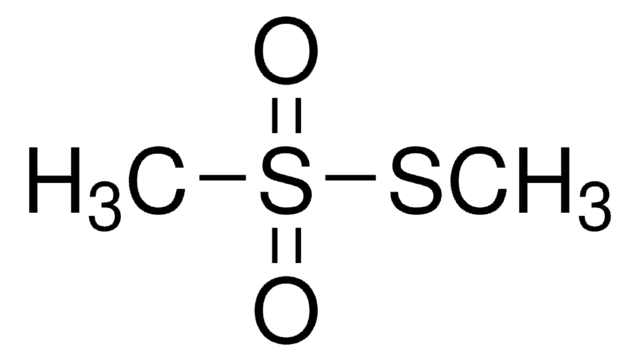50187
Ammonium 2-(methylthio)ethanesulfonate
≥97.0% (TLC)
Synonym(s):
Methyl coenzyme M ammonium salt
Sign Into View Organizational & Contract Pricing
All Photos(1)
About This Item
Empirical Formula (Hill Notation):
C3H11NO3S2
CAS Number:
Molecular Weight:
173.25
MDL number:
UNSPSC Code:
12352106
PubChem Substance ID:
NACRES:
NA.25
Recommended Products
Quality Level
Assay
≥97.0% (TLC)
SMILES string
N.CSCCS(O)(=O)=O
InChI
1S/C3H8O3S2.H3N/c1-7-2-3-8(4,5)6;/h2-3H2,1H3,(H,4,5,6);1H3
InChI key
FSGSBLDVKBYXIK-UHFFFAOYSA-N
Application
Ammonium 2-(methylthio)ethanesulfonate (Methyl coenzyme M) is converted into methane by the enzyme Methyl-coenzyme M reductase (MCR) derived from methanogenic archaea. Methy-coenzyme M is used in studies on methanogenic (methane-producing) enzymatic processes.
Packaging
Bottomless glass bottle. Contents are inside inserted fused cone.
Storage Class Code
11 - Combustible Solids
WGK
WGK 3
Flash Point(F)
Not applicable
Flash Point(C)
Not applicable
Certificates of Analysis (COA)
Search for Certificates of Analysis (COA) by entering the products Lot/Batch Number. Lot and Batch Numbers can be found on a product’s label following the words ‘Lot’ or ‘Batch’.
Already Own This Product?
Find documentation for the products that you have recently purchased in the Document Library.
L G Bonacker et al.
European journal of biochemistry, 217(2), 587-595 (1993-10-15)
Methyl-coenzyme M reductase (MCR) catalyses the methane-forming step in the energy metabolism of methanogenic Archaea. It brings about the reduction of methyl-coenzyme M (CH3-S-CoM) by 7-mercaptoheptanoylthreonine phosphate (H-S-HTP). Methanobacterium thermoautotrophicum contains two isoenzymes of MCR, designated MCR I and MCR
Corinne Biderre-Petit et al.
FEMS microbiology ecology, 77(3), 533-545 (2011-05-21)
Lake Pavin is a meromictic crater lake located in the French Massif Central area. In this ecosystem, most methane (CH(4)) produced in high quantity in the anoxic bottom layers, and especially in sediments, is consumed in the water column, with
J T Keltjens et al.
European journal of biochemistry, 172(2), 471-476 (1988-03-01)
Cell-free extracts of Methanobacterium thermoautotrophicum (strain delta H) were found to contain high concentrations of inorganic pyrophosphate (up to 40 mM). The compound was accumulated by the organism despite high activity of inorganic pyrophosphatase which was found to be present
K D Olson et al.
Proceedings of the National Academy of Sciences of the United States of America, 88(10), 4099-4103 (1991-05-15)
Inactive 2-(methylthio)ethanesulfonic acid (CH3-S-CoM) reductase was partially activated by exposure to light. This simplified system replaces the complex enzymatic system of protein components A2, A3a, A3b, and ATP, which previously represented the only available means of reactivating the enzyme. Components
P E Rouvière et al.
Journal of bacteriology, 170(9), 3946-3952 (1988-09-01)
When titanium(III) citrate was used as electron donor for the reduction of methyl coenzyme M by the methyl coenzyme M methylreductase system of Methanobacterium thermoautotrophicum delta H, component A1 was no longer required. The simpler system thus obtained required components
Our team of scientists has experience in all areas of research including Life Science, Material Science, Chemical Synthesis, Chromatography, Analytical and many others.
Contact Technical Service






